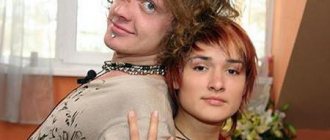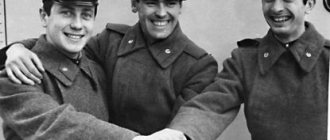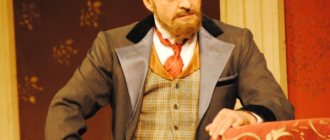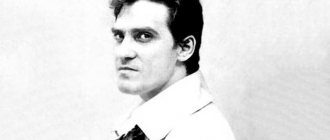Childhood and youth of German Sterligov
Today, German Sterligov is known as an extravagant millionaire, capable of giving up his fortune at a moment and devoting himself to agriculture, and then also unexpectedly returning to his previous business.
However, the childhood years of Sterligov, the heir to a noble family, were not spent at all in an atmosphere of wealth and idleness. When German was 5 years old, his family moved to Moscow, where the boy went to study at a specialized school with an English bias. After graduating from school, he was drafted into the ranks of the Soviet army. Sterligov remembers his army years with nostalgia, viewing service as a good school of life that cultivates true masculine character.
Having repaid his debt to his homeland, German returned to the capital and worked as a turner at an automobile plant for about a year. He devoted the next year to studying at the Faculty of Law of Moscow State University, from where he was forced to leave after a conflict with one of the teachers.
The beginning of the career of businessman German Sterligov
Failure did not break the young man, who was not used to sitting with his hands folded. Then German Sterligov decided to organize a cooperative, called “Pulsar”. The organization was designed to provide legal services to the population.
German Sterligov became a millionaire in his youth
In 1990, Sterligov became the founder of the country's first commodity and raw materials exchange, Alice. The project turned out to be so successful that by 1993, Alice had become a large holding company with 84 subsidiaries both in Russia and abroad. With the capital he earned, Sterligov acquired shares in various organizations, sawmills and fish factories.
One of the first Russian multimillionaires, in 1991 German Sterligov headed the Russian Club of Young Millionaires, whose activities were aimed at improving the Ryazan region, but the declared improvement work was not carried out, which is why all the activities of the organization gradually came to naught.
How can an enterprise pay salaries if it leaves the cash flow system? "Money won't disappear completely, but there will be no more credit and therefore no more bubbles," he explains. His confidence is annoying. His project looks crazy. So, this means that Russian enterprises will become competitive by exchanging wheat for cars, and oil for cucumbers? “This is not just about barter, but about a new payment system, new accounting,” he explains between two conversations on his mobile phone, sitting in his office overlooking the frozen Moscow River.
German Sterligov is no stranger to the world of business. In 1990, taking advantage of the liberalization that blossomed against the backdrop of perestroika, at the age of 23 he became the country's first millionaire. 'Alice', the first commodity exchange, named after his dog, brought him big profits. However, nothing foreshadowed that this son of a pediatrician, educated in the best Moscow educational institutions, would begin to make a career in the barter business.
Very quickly his business took off, the family began to live in grand style: luxury real estate abroad, luxury cars, bodyguards. Soon the Sterligovs, members of the club of young millionaires, built a large residence with a glass dome in the most fashionable quarter of the Russian capital on Rublevskoye Shosse.
However, in 2004 everything collapses. To satisfy his political ambitions, Herman had created the “Word and Deed” party several years earlier. However, his program - a new order, patriotic and Orthodox - was a fiasco. His attempt to become Moscow mayor also failed.
And then the Kremlin blocked his way. Sterligov tried to run for president in 2004, but his candidacy was removed from the lists under the pretext that the signatures collected in support were invalid. The debt-ridden billionaire sold off his assets cheaply. He chose life in the village and started raising cows and sheep.
Every morning, this atypical moujik spends two hours traveling from his farm - a hut 80 kilometers from Moscow - to his office. For four years now, German Sterligov with his wife and five children has been living in the middle of the forest practically on self-sufficiency. They raise cows, sheep, and chickens, heat their houses with wood, and use candles instead of electricity. Children read the Gospel, scientific works, but in no case “novels woven from lies.”
However, the Anti-Crisis Center lives on universal time. One wall is entirely occupied by twelve clocks and two geographical maps - on the one hand, Russia, on the other, the rest of the world. Small flags indicate already opened branches: thirty in Russia and five abroad. The centers operate as mixed enterprises and a minimum contribution of €30,000 is required to participate. Slowly the barter exchange is weaving its web.
After London, Hong Kong, and Brussels, it is planned to open a center in Paris, on the Champs Elysees. Sterligov says he invested 15 million euros in the project. He rented an office in the most expensive business center in Moscow. The annual rent of one floor in Tower B, where the Anti-Crisis Center is located, costs about $300,000, and barter is out of the question!
Barter is not new to Russia. It flourished in the 1990s, during the collapse of the USSR, when the economy, with a low degree of monetarization, was in complete decline. At that time, workers were often paid wages in the form of goods (matches, crystal glasses, towels, bras), and they themselves went to sell them at train stations or stood on the roadsides.
Today, when the ruble has depreciated by 35% and the stock market has collapsed by 80%, debts and non-payment of wages have reappeared. Loans are too expensive, there is not enough money. Without waiting for the Anti-Crisis Center to appear, construction companies are already exchanging apartments for building materials. Supermarkets pay their employees in the form of purchase coupons. Most economists believe that this is a temporary solution to the problems.
Sterligov’s project, on the contrary, was created for the long term. Because from the height of his skyscraper, the ascetic sees distant horizons. His project involves a radical restructuring of the current way of life. The crisis has proven that 'the planet is on the brink of an abyss'. Before his mind's eye he already sees crowds of hungry unemployed people fleeing big cities, revolutions, "local nuclear conflicts" unleashed by governments seeking to "distract attention from the real problems." He is sure that salvation lies in returning to the earth. 'The government must allocate land to the unemployed!'
Europeans will be welcome here. Why don't they come to cultivate Russian soil? They will soon run out of space because, in his opinion, the Old Continent "will be overrun by Arabs and blacks." Moreover, it is better to have Europeans living in Russia, “people with whom we have a lot in common,” than “Tajiks,” who make up the majority of guest workers in the Russian Federation.
The speeches of this patriot, mystic and seer are intriguing. His calls are reminiscent of the slogans of the communist era or the hippie movement. He talks about “a new life, bright and joyful,” about the need to “return to the land of our ancestors,” about the end of “office slavery.” It’s not very modern, this Sterligov model! This original wants to return Russia to the economic Stone Age and believes that moving backwards can make a huge leap forward.
InoSMI materials contain assessments exclusively of foreign media and do not reflect the position of the InoSMI editorial staff.
German Sterligov in politics
German Sterligov approached active participation in big politics slowly and in small steps.
In 1992, he visited Chechnya with the prospect of representing its interests on the world stage. In 1996 he became leader of the Moscow nobility. In 2002, German Sterligov became a candidate for governor of the Krasnoyarsk Territory. A year later, he nominated himself for the post of mayor of Moscow. He was supported by members of the social movement against illegal immigration, whose ranks he joined shortly before his nomination. Despite the ongoing election campaign and all attempts to attract the maximum number of like-minded people to his side, Sterligov lost the election, taking third place and receiving 3.65% of the vote.
German Sterligov: We are being cheated like suckers. 2004 is the year of the next presidential election, in which a political figure who was gaining popularity simply could not help but take part. The election campaign literally became an expensive pleasure for Sterligov. The need to repay numerous loans led to the fact that the house on Rublyovka was sold, and the Sterligov family was forced to move to the Mozhaisk district of the Moscow region.
German Sterligov “Being ruined is the best way to change your life”
When we agreed on a visit to the estate of the former oligarch, and now, as he calls himself, sheep farmer German Sterligov, his assistant warned that the woman should be in a skirt, and the man should have a “correct”, masculine appearance. Here, in Sloboda Sterligov, located at some distance from the Novorizhskoe highway, among the picturesque hills, their own order reigns. The security guards who met us at the entrance warned us that smoking was strictly prohibited on the premises, and that we had to hand over our mobile phones, leaving them in special wooden boxes on the street. Everything here is like in the old days - wooden huts, barns and a bell over the gate, which you need to ring to announce your visit.
The heavy door in the huge hut is made in a completely traditional old way - to pass, you have to bend down. And then some slight change in consciousness occurs - a complete feeling is created that you have found yourself in a different era. In a surprisingly huge room for a traditional hut, which serves as a living room, a kitchen, a dining room, a reception room, and a chapel, the fire in a huge stove burns merrily. Sometimes one of the children climbs onto the stove, and aromatic food ripens inside it.
Weapons hang on the walls. This house is considered the male half - the female half is in another hut. Sterligov’s charming wife, Alena, mother of five children, treating us to bread from her own bakery with fragrant honey and tea with thyme, tells us that such a division is convenient. After all, while the children were growing up, she practically did not get enough sleep, and now, on her female side, she can finally be at peace. The Sterligovs have five children - their daughter Pelageya is already married. Sons Arseny, Sergius, Panteleimon and Micah are from 7 to 15 years old.
There are many people in the house - sons dressed in old-style military uniforms, their friends, some like-minded neighbors. One of them, again in a rare military uniform, is frying potatoes in the oven in a large frying pan. Many guests come here, and today a group of those who want to settle in nature in the Mozhaisk region, where Sterligov’s family previously lived, has arrived.
After the first reinforcements, while German Lvovich has not yet returned from the next filming, his son Arseny leads us around the house. Beautiful proud horses, goats, and, finally, that same bakery with a well located right inside. The grain is ground in a stone mill. The territory is quite spacious and stretches to the forest.
And then, accompanied by other travelers, upon the return of the owner, we are invited to taste wonderful natural delicacies - fish, those same potatoes from the oven, cabbage and tomatoes salted in a special way, homemade wine. After this, German Sterligov answered our questions.
German Lvovich, the reason for your departure to a proper life in the lap of nature was solely your ruin? Or even before that, there were still some thoughts “about escaping”?
There were thoughts. But it was impossible to escape. The best way to change your life from bad to good is to go broke. Losing a job, losing a home, getting into debt are all the best incentives to stop living a terrible city life.
Previously, your family lived in the Mozhaisk district. Did you move from there because of the conditions there - I know that, for example, there was no electricity there?
We wouldn't have moved if it weren't for a bunch of fleas. They kicked us out. Well, in general it was more difficult there. Unlike Sloboda, there was no road there. Carrying every log and every suitcase became simply a feat. But it was the fleas that finished us off - they ended up on us, on the furniture, on our clothes. But what’s interesting is that as soon as we escaped from there, the fleas disappeared. Other people have lived there for five years and no one has seen a single flea. This means that there was some kind of divine providence in this.
What did you like about this area?
Well, firstly, even before moving we knew that there was an adequate administration here that did not oppress the peasants. But, besides, I immediately liked this plot, and when I found out that the owner was selling it, I immediately gave him the deposit. I didn’t have the rest of the funds, but I found it.
Did the ecology of the area also probably play a role in your choice?
Yes, the ecology here is good, compared to many other areas of the Moscow region, which, however, may worsen, to say the least. The patch of surface water, which spreads out from Moscow as a chemical runoff, has already reached Anosino, and in 25 kilometers it will be here. And as a peasant and father of a family, I appeal to the Moscow government with a demand to ban chemical detergents. If contamination of drinking surface water continues, then we will have to leave here, because we will not be able to give water to children and livestock. It is necessary to stop the sale and supply of chemical products and replace them with natural detergents. This is the most important task now. This requires a transition period of approximately 2 years. Previously, dishes were washed with soda and mustard; the latter, by the way, cleans well. Here, in New Riga, after all, a bunch of influential people live, I urge their wives, who have a developed maternal instinct, to tell their husbands to take up this issue. Otherwise, we'll stop everything.
Returning to the topic of district administration: do you still have good relations?
Well, I wouldn’t say that we have any kind of relationship, but there is no interference, extortion, or extortion towards the peasants. The only danger, which, however, does not depend on the administration, is veterinarians trying to vaccinate our cattle and infect them with all sorts of diseases. But we don’t let these pests in.
It is written on your website that in order to move here, you must have a beard, not have a TV, and not send your children to school. But are these criteria enough?
Of course, external signs are not enough. But they determine a lot. It is clear that if a promiscuously dressed woman or a Hare Krishna comes, it is not for us.
How many people have already moved in with you?
No, not much.
Are there those who, like you, belong to the class of, so to speak, very wealthy people?
Yes, there are some.
Your children are being educated at home. Are they taking the traditional school program as an external student?
Well, here’s my daughter, she’s the eldest in our family, she passed the test and easily entered the university. Fortunately, I studied there for a short time and got married.
That is, if you don’t have to go to school, do children still need higher education?
No, then I was just cowardly, my women berated me on the topic of where, they say, she would find a groom, but she doesn’t communicate with anyone. In general, it was for a party, not for education.
Do you think your sons will go to universities?
I hope not. They are healthy guys, normal men.
Teachers from the local rural school have come and come to you. Do you think that rural education is at a decent level?
In a rural school you can learn to read and write in Russian and know arithmetic. And that's enough. Everything else needs to be learned from books, these are the best teachers. There are no correct teachers teaching, say, correct history, either in rural schools or at universities. In general, history, geography, culture, religion are a kind of complex, they cannot be separated. We teach history to our children from ancient sources.
Based on your views, I think you have certain complaints about biology.
We don’t teach biology at all, it’s a satanic science. And then scientists grow up who destroy the environment.
That is, some subjects are completely excluded from your personal educational program?
Undoubtedly.
You are already building houses for your eldest sons, I know that they are submitting estimates for your consideration. Previously, in the old days, sons built their own house after marriage, but it seems too early for your children to think about it.
They build them themselves, not me. This is a foundation for the future, so that later there will be somewhere to bring my wife. This daughter is a cut off piece, and sons should remain in the family. The disgusting sentimental phrase “fluttered out of his parents’ nest” is some kind of literary abomination. Why should a father create a farm if his son does not inherit it, but “flees off” somewhere? Was he found in the trash heap, or does he have no parents? What is this phrase: “You have to achieve everything yourself”? And then why father?! The son must stand up to his father’s achievements and start further.
Do the children have friends outside of Sloboda?
Yes, you see, they are running. But, of course, these are the children of our Orthodox like-minded people - after all, whoever you get along with, that’s how you’ll gain. We must protect children from bad examples and ensure that their friends are close in spirit. This is not possible in the same school.
You are against TV and mobile. But you use the Internet, blog...
I have an iPod, but it doesn’t have a SIM card - it only works via Wi-Fi. I only go online when I'm in Moscow. Here I have no Wi-Fi or other similar communications. But children do not have the Internet and now there are no mobile phones from which they can also access the Internet. Considering how dirty our Internet is, a child can be molested in 5 minutes. As for the mobile phone, with it a lot of unnecessary things have disappeared from my life - all sorts of rescheduled arrangements and postponements of meetings disappear, as agreed upon, as agreed upon. My assistant and some others around me have a phone. Whoever wants to destroy the soul, let him destroy, and we will use it for now.
Now all sorts of eco-farms are appearing, even here, in New Riga, there is the Konovalovo eco-farm. How does your farm differ from theirs in its principle?
If they really produce products without any chemicals and without any genetic modification, without the use of modern technologies at any stage, then nothing.
However, as I understand it, you make a difference between private farming and private farming?
Naturally! After all, the farmer depends on the bank. In order to pay off those who are hanging over him, he uses chemistry and genetic modification to make the products cheaper and have more of them. As a result, farms often produce poison.
And yet, can the state harm a private peasant in the same way as a farmer? Onishchenko periodically comes up with all sorts of ideas.
Well, yes, sanitary services are the first enemy of crop and livestock farmers. But they cannot forcefully vaccinate our cattle; we would rather kill them. They can roll us like a roller.
What, in your opinion, should the state do to support peasant farms?
Create conditions for the resettlement of the metropolis so that there is no environmental disaster. Those surpluses that the metropolis has sucked into itself must be spat out. It is necessary to give land free of charge to those who want it, and for this it is necessary to cancel the procedure for registering agricultural land, provide building materials free of charge, and exempt from all taxes, fees for veterinarians and other things for at least 10 years. After all, the state will benefit from the fact that natural products will be produced and healthy children will be born. And a lot. The sooner the authorities begin to do this, the greater the chances for us and them to survive - after all, there will be normal food, water, and the absence of modern monstrous diseases. We need to jump off the needle of scientific and technological progress and fight environmental terrorists in the form of our scientists, who always get away with impunity.
Nevertheless, on TV you urge people from dying cities to move, but so far there is no real support.
Well, of course, without building materials and support the process will be much slower, there are, of course, heroes, but the state must also take care of the weaker.
Are you fully self-sufficient in food?
Yes, almost everyone. We only buy salt.
Well, what about tea and coffee?
We don't drink this so-called tea of yours. We use fireweed and thyme. Only my wife drinks coffee, but, unfortunately, you can’t wean her off it. However, this coffee is brought to us from Colombia.
Do you sell your products in any retail outlets?
No, customers only come to us here. We bought an excellent stall on wheels, equipped with modern technology, but we can’t install it anywhere because we need to collect so many pieces of paper. Therefore, it is easier to trade right here on the site. Because there are standards that feed a bunch of parasites and give way to all kinds of poison.
You once said that you sell meat to your millionaire friends for a lot of money.
In fact, we are now selling it to everyone, and it’s not that expensive. At the moment, my son Sergius is selling, he is 12 years old, and he does not yet have millionaire friends, so he sells for 500 rubles per kilogram. For real meat it's very cheap. He started fat-tailed sheep - now there are many mountain people who love this meat. Each of my children has their own business. Sergius, for example, also makes birch bark glasses.
But all these things - the bell at the entrance, birch bark glasses - is there, after all, a certain amount of theatricality in this?
No, purely functionality. There is a bell so that no one yells under the gate, and birch bark glasses are very functional, they are made instantly and last for 20 years. We don’t have museum crap for beauty; everything you see in our house serves purely functionality.
Is your business exclusively in the agricultural field?
Yes, and its main component is baking bread. We bake 40 loaves a day, sell each loaf for 500 rubles, and we make 12-15 thousand a day in net profit. Children do this, but they give me the money. Our son Sergius is our cashier. From this I give them money for clothes, for teachers, for the construction of a new bakery, they have enough for everything.
Are all children involved in the work? And even the youngest?
If someone was idle, they would immediately get hit in the back of the head from their elders. They start working as soon as they come off the chest.
I remember in 2003 you ran for mayor of Moscow. And now, as I understand it, you have left politics completely?
Yes. By the way, then four criminal cases were opened against me for extremism. And I didn’t become mayor, and I was almost sent to prison. But I just said: stop bringing guest workers to Central Russia, because we have the conditions for locals to work. As a result, Luzhkov created the imbalance that leads to interethnic conflicts.
Why did you get the nickname “undertaker”?
Because we had a coffin office of the Sterligov brothers with memorable slogans like: “You will fit into our coffins without diet and aerobics,” or “Where are you rushing, Kolobok? “I’m in a hurry to buy myself a coffin.” Well, as part of a PR campaign, a letter was written to US President George W. Bush to stop the US invasion of Iraq. This issue was being discussed in the US Congress at that time, and we added fuel to the fire to help opponents of the invasion. They offered 50 thousand coffins from Russia with significant discounts. It was a powerful document - in a grotesque form, but it worked well. We managed to delay the invasion by three and a half days, and if Foreign Minister Ivanov had not stopped me then, it would have been possible to delay it by three and a half months.
But do you still watch politics?
I simply, like a number of my supporters, make proposals to the leaders of different countries about the creation of an International Environmental Tribunal and new international environmental legislation. So that we do not lose normal fresh water, plants and animals, which are already being cross-modified. We have already lost a lot, but at least we will not perish from the achievements of scientific progress.
Can you say that house-building reigns in your family?
No, Domostroy is a heretical book written by the heretic Sylvester as fiction. We must focus on the Holy Scriptures, the epistles and acts of the apostles, the decisions of the Ecumenical Councils, everything is said there about how to live.
But it seems to me that you still have some of your own interpretations?
There are no interpretations and not the slightest deviation from the text.
And you have nothing in common with the Old Believers, who also consider it obligatory to wear a beard and do not keep a TV at home?
No. Faith can only be old. New rules of religion cannot appear, all this is heresy. We believe as people believed, from the era of Ancient Rome to Ancient Rus'.
But you, in my opinion, are the only one who lives according to your own calendar, which is 8 years ahead of the traditional one.
I'm not the only one who lives like this. In Muscovite Rus', chronology and production documentation were carried out from the creation of the world. And Peter I, following the Europeans, introduced a new calendar from the Nativity of Christ. In 1708, he wrote a Decree, according to which everyone was obliged to consider that the year 1699 was coming to an end. And the obedient godless slaves lived another 8 years. According to the correct rules, the New Year from the creation of the world and from the incarnation of Christ is celebrated on one day - March 25, old style.
Personal life of German Sterligov
At first, life in new, unusual, and sometimes completely unsuitable conditions was not easy for members of the Sterligov family. Four small children, the eldest of whom, Pelageya, was only 12 years old at that time, and a pregnant wife were forced to live in an army tent. The construction of the country house has not yet been completed. However, the way back was impossible and the former socialite of the 90s Alena Sterligova became the real wife of the Decembrist, who did not leave her husband in a difficult life situation.
German Sterligov with his family in the village
Today, past hardships are behind us, the Sterligovs live in a cozy hut. They are engaged in agriculture, and consider their children to be their main wealth. The daughter and four sons of the Sterligovs received a good education at home. They did not go to school, but a hired teacher came to their house to give private lessons.
Herman did not allow his eldest daughter to go to university, since he does not see a woman’s calling in making money. Now Pelageya is happily married and has given her parents two granddaughters.
Modern activities of German Lvovich
Sterligov knows how to earn millions, even as a peasant. In the 2000s, he abandoned city life, moving to the Moscow region, where he started a private household with rural land. Subsequently, he founded the “Bread and Salt” franchise, which ceased operations in 2020. Now the main source of income is Sloboda, a peasant farm with an area of 80 hectares. On the official website of Sloboda, the Sterligov family invites those who want to plunge into village life and “feel reborn.”
Every Saturday there is a traditional fair where farmers from all over the country can sell their natural products. All family members work here, including children and son-in-law. The cost of visiting Sloboda is 2,000 rubles. per person. In addition, natural products produced in Sloboda are available for everyone to order - delivery is carried out throughout Russia.
Approximate income of German Sterligov from the sale of natural products and excursion activities in Sloboda (in rubles):
- year - 20,000,000;
- month - 1,600,000;
- day - 50,000.
The entrepreneur's current net worth is approximately 50,000,000 ($815,000), taking into account tax and labor payments.
Which project of German Sterligov do you consider the most successful?
Many people are interested in where the estate of German Sterligov is located. The exact location is Moscow region, Istra district, Nizhnevasilievskoye village. Sterligov is not only a name, but also a brand, so there are countless people willing to visit the entrepreneur’s private home.
Be sure to read it! Putin or Russian oligarchs: who has more income?
German Sterligov today
Now German Sterligov calls himself one of the poorest people in Russia, which does not prevent him from traveling and staying in expensive and comfortable apartments and donating money to improve the environment in Russia. What's the secret? According to Sterligov, farming, baking natural bread and selling it are all the family’s sources of income. Despite the fact that his fortune has decreased tenfold, German Sterligov only now felt himself to be a truly rich man, living life to the fullest.











